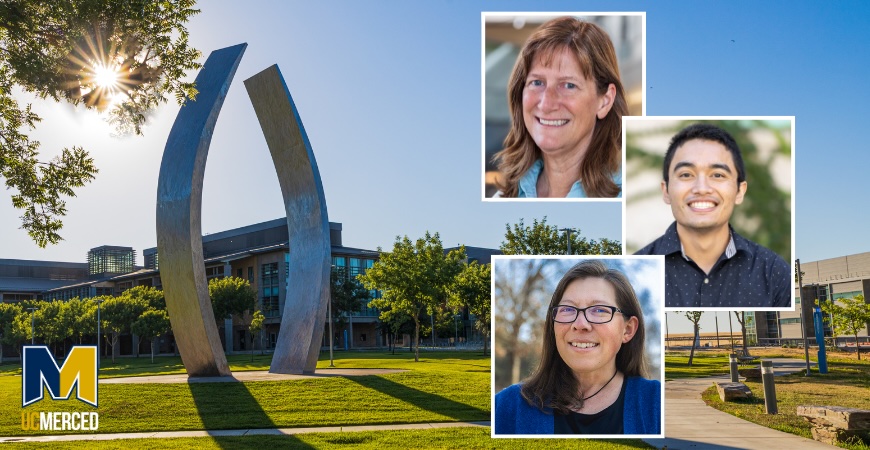
Three professors are joining UC Merced’s Agricultural Experiment Station this fall, bringing more expertise and resources to the 3-year-old research center.
Management of complex systems Professor Crystal Kolden will focus on the intersection of agriculture and wildfire, public health Professor Andrea Joyce will work on sustainable, environmentally friendly agricultural insect management and life and environmental science Professor Josh Garcia will examine plant-soil-microbe interactions.
UC Merced and UC Santa Cruz received AES designations in 2022, the first UC campuses so named in 50 years. An AES is a scientific research center at a land-grant university that explores challenges and develops improvements to agriculture by working with farmers, ranchers, suppliers, processors and others. Work at the AES advances innovation, fosters sustainability and builds climate resilience to meet the needs of the San Joaquin Valley and beyond.
Kolden is a nationally recognized authority on the story of wildfire and the director of the UC Merced Fire Resilience Center. Her research focuses on characterizing and understanding wildfire intersections with the human-environment system through geospatial, temporal and mixed-methods approaches.
"Joining the AES will complement my existing USDA NIFA (National Institute of Food and Agriculture) funding for conducting research on fire in working landscapes with tribal partners and farmers,” Kolden said. “I'm excited to expand on our nascent efforts to reduce wildfire disasters with strategic use of crops and cultural fire."
Joyce is an entomologist who works with insects that impact agriculture and public health, and works with beneficial insects to control pests. She is affiliated with the Sierra Nevada Research Institute.
“I am excited to continue working with local farmers and to promote the use of beneficial insects and alternatives to insecticides,” Joyce said.
Garcia is new to the university. A National Science Foundation and UC President's Postdoctoral Fellow at UC Davis, he researched how regenerative management practices such as compost applications and crop rotations influence the soil food web and biogeochemical processes in traditional field-based agriculture and urban agriculture.
“I chose to come to UC Merced as faculty for the exciting opportunities for interdisciplinary collaboration and to get involved with expanding UC Merced's work in sustainable agriculture with the new AES,” Garcia said.
He will pursue applied research and outreach in the areas of soil health, regenerative agriculture and waste reduction and looks forward to working with his colleagues to understand how types of compost made from municipal waste change the soil and what the implications of that might be.
“I'm also looking forward to finding new and innovative ways to outreach our findings and science-based information to diverse stakeholders here in California,” Garcia said.
The trio joins the four founding inaugural AES faculty: mechanical engineering Professor Reza Ehsani, civil and environmental engineering professors Safeeq Khan and Josué Medellìn-Azuara and life and environmental sciences Professor Rebecca Ryals.
Professor Joshua Viers, executive associate dean for the AES, said, “This is an exceptional group of faculty and we are very pleased to have such broad representation from across our schools. It speaks to the continued investment UC Merced is making to address issues of importance to the San Joaquin Valley and beyond.”
The station is aimed at building on agricultural research that has been going on at UC Merced since the university's inception, including at its Experimental Smart Farm. The 45-acre property, roughly a half mile south of campus, grows various crops and serves as an outdoor lab for student and faculty researchers.




 Public Information Officer
Public Information Officer

